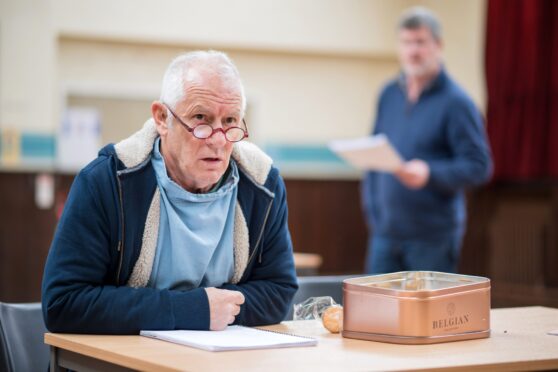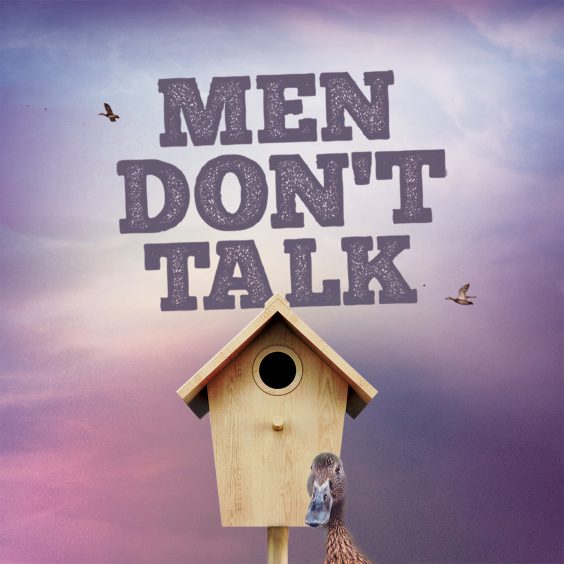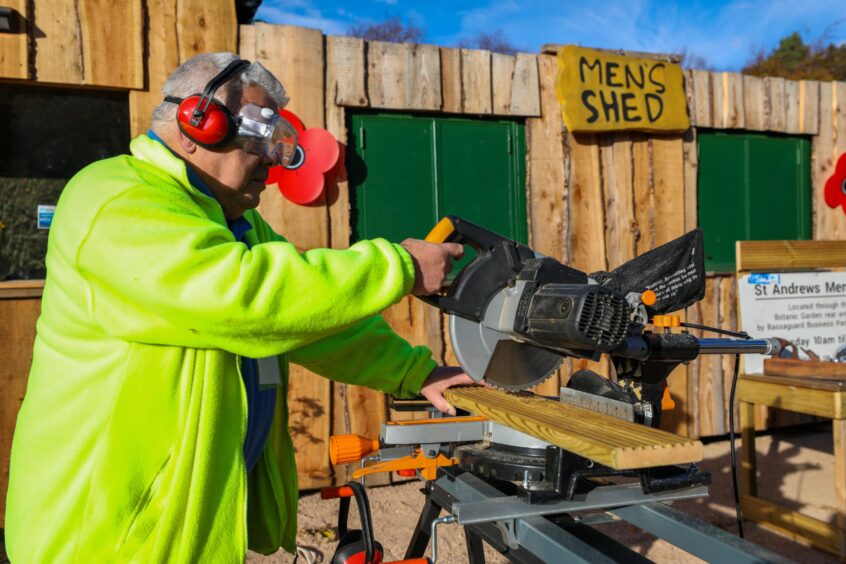
For the past decade many Scots have found camaraderie, companionship and connections down at their local Men’s Shed.
The movement of community spaces that provide a space for craftwork and conversation has helped thousands struggling post-retirement or after the loss of friends and spouses to find a place that’s comfortable to talk about issues they’re facing.
It’s now inspired new play Men Don’t Talk, touring Scotland across the coming weeks, which aims to highlight the impact a humble shed can have and the importance of securing continued government funding and younger participants.
For actor Billy Mack, who stars alongside Greg Powrie and Dougal Lee in the play, he’s found being involved particularly poignant.
Talking shoulder-to-shoulder
“The stories in the play are entertaining and tragic at the same time,” he said. “There’s a culture that we keep things to ourselves, don’t want to be a burden on anybody.
“I’ve lost five men friends to suicide and that’s me, just one person. I was thinking, where’s the failing? Where does this come from?
“People are falling under the radar. We’re not giving them the help they need.
“A friend of mine was widowed recently and everybody comes round and offers support, but days, weeks and months later, it starts dying off and gets a little bit quieter.
“You can be very lonely, so there’s an opportunity where you can go down to the shed.”
The ethos of the sheds is that many men find it difficult to talk face to face, but it’s a different story if they’re shoulder to shoulder working.
It’s a space where they can feel like they’re part of a team with a focus and purpose in an environment that is welcoming, free, and away from alcohol.
“I wasn’t aware of them before getting involved,” Billy said. “When I learned stories about how it opens doors for people and gives them the opportunity to have conversation, I thought it was a damn fine idea.
“You work on a project that doesn’t get finished in just one day, so the conversations aren’t limited to one visit. You might drop a little nugget in about what’s going on in your life.
“It’s a constant ability to share problems you’d normally keep to yourself, and you feel as if there’s something about you of value, rather than being at home sitting in sadness.
The play tells the story of three men who have never met before finding a world of banter, bird boxes and biscuits at their local shed.
It was written by Clare Prenton with the help of workshops with real ‘shedders’ where they shared their experiences.
The project has been quite a journey from having tea and biscuits with a group of ten men at the Peebles and District Men’s Shed to now having a show heading on the road.
“It’s had its own lovely momentum because of the subject matter and the desire to think about men’s wellbeing at the moment,” Clare said.
“I had some provocation questions to get started, but it soon became apparent they had lots to say.
“The script is a real mix of what these men shared and creating fictional characters so that there’s a distance from them.
“We’re not putting their lives on stage, but what they were worried about, what they enjoyed about the shed and the real reason they love coming.

“Whether they’re busy making things or busy eating biscuits, social interactions are taking place and there are people asking how you’re doing, which becomes this valuable touchstone in people’s week.
“Ironically, the sessions always overran. My suspicion going in was that men do talk given the right circumstances and the right questions asked in the right manner.
“One gentleman had lost two wives. There were tears over the cake, but it always felt really good to talk. I couldn’t have written the play without their input; they are co-creators.”
A worldwide movement
The Men’s Shed is a worldwide health movement that stretches across at least 16 countries, with its origins in Australia.
Jason Schroeder started a shed in Westhill, Aberdeenshire, in 2013 and is now the Executive Officer of the Scottish Men’s Sheds Association, which celebrated its tenth anniversary this month.
They support over 10,000 shedders across 138 sheds, but there are still many who don’t know about their work.
It’s hoped the play can help change that and it also heads to the Scottish Parliament for MSPs to watch.
“The human aspect can be so diverse and different and Clare’s done an absolutely fantastic job with it,” Jason said.
“The shed is a building, it has stuff in it, but really it’s the people. Every shed has different characters.”
Funding battle
The Sunday Post reported earlier this year that the SMSA faced being wound up after the Scottish Government didn’t provide funding.
Money was then given, but the charity continues to battle for more support for a project they believe is worth much more than their most recent grant of £75,000 for the year, with social health benefits, backed by research, stretching wide.
“I’ve heard so many say that if it wasn’t for the shed they’d be dead,” Jason said.
“Scotland unfortunately has the highest suicide rate of men in the UK.
“Those are our sons and fathers and we know that Men’s Sheds are the biggest prevention movement in the country, rather than a reaction strategy, like a lot of other organisations.
“We hope they’re going to seriously give us the funding to put in place what this movement in Scotland really requires.
“It’ll save them billions, we know Men’s Sheds are giving a social return of £10 to £15 to every £1 invested in them.
“We’ve probably got a ten-year window to embody this movement and support it financially to get younger men involved so it isn’t going to collapse when the present trustees get ill or die.
“We’re at a critical point now or we’re going to lose the whole thing.”
Men Don’t Talk tours Scotland across October/November. Visit genesistheatreproductions.co.uk/men-don-t-talk.
When life is difficult, Samaritans are here – day or night, 365 days a year. You can call them for free on 116 123, email them at jo@samaritans.org, or visit samaritans.org to find your nearest branch.

Enjoy the convenience of having The Sunday Post delivered as a digital ePaper straight to your smartphone, tablet or computer.
Subscribe for only £5.49 a month and enjoy all the benefits of the printed paper as a digital replica.
Subscribe © Steve MacDougall / DCT Media
© Steve MacDougall / DCT Media © MIHAELA BODLOVIC
© MIHAELA BODLOVIC